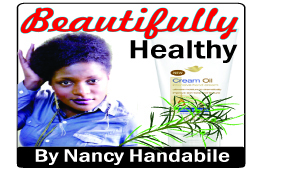HELLO I trust that you had a great week and that you are staying afloat in this rather unpredictable weather.
I had an interesting conversation last week when this lady that I was seated next to got tired of hitting her own head and picked up a pen instead to scratch her itchy scalp.
It was an amusing scenario because in as much as her relief was obvious I couldn’t help but wonder what havoc that pen was wrecking on her scalp and the blisters that it would cause.
You all know how much I love home remedies but that does not mean that you should not go to a hair stylist (as long she knows what shes doing and is not putting a thousand chemicals on your scalp), a suggestion would be NC Hair Studio.
So I have jotted down a few pointers on what you can do.
Blackgirllonghair.com recommends chamomile due to its its natural anti inflammatory properties so if you have an inflamed scalp do a tea rinse by putting some tea in a cup of water then using an applicator bottle to apply it to your clean scalp. You do not have to rinse it out, just style as normal.
Am sure that by now modst of you have come across the term ACV which stands for Apple Cider Vinegar.
Here’s what you do get Apple Cider Vinegar in any shop and after washinbg your hair dilute ACV with water and rinse your scalp, don’t worry the vinegar smell disappears after minutes. Just dilute it well as it might sting like crazy.
Otherwise it is a Godsend because it is used for its clarifying properties as well as its ability to help reduce hair porosity as a rinse due to its low pH balance.
It also has anti-bacterial qualities that make it particularly helpful in treating an itchy scalp that is caused by bacteria build-up, and against any fungal condition (yeast on the scalp). Yeast don’t like an acidic environment so swabbing the scalp with an ACV solution can be helpful
Mix some tea tree oil in coconut oil and swab your scalp or use an applicator to regularly spray your scalp.
For both oils its better you buy the ones that is oil and not added to theses balms and pomades on the market.
Tea Tree Oil has amazing anti septic qualities because it has anti-fungal, anti-viral and anti-bacterial properties but you should not use it alone in its pure version that’s why you are mixing it with coconut oil which is a carrier oil.
The capyrilic acid in coconuts inhibit the growth of fungus actually caprylic acid is also an active ingredient in a lot of vitamin supplements for women who are trying to suppress an overgrowth of candida (yeast) throughout the body.
Another remedy is the use of a paste made from baking soda and water, but first rub some olive oil on your scalp before you apply the mixture.
Leave the paste on for about 10-15 minutes then wash it all out.
Mash up a banana and avocado, any dry scalp will love this mix, put some on your hair as well as its nourishing and conditioning properties are quite exemplary. Apply it to your scalp and your hair if you want, ( even your face) leave on for 30 minutes and rinse thoroughly.
Another trusted remedy (though quite costly ) is the use of Jojoba oil which is a great all-natural moisturizing treatment to relieve a dry scalp.
allwomenstalk.com says that Jojoba oil’s molecular structure is closest to that of our own natural oil or sebum, so it makes for a great rejuvenating and hydrating treatment. Massage about a quarter size amount of Jojoba oil into your scalp for a few minutes and repeat once a week.
Take an aloe vera leaf, cut it open to reveal the fleshy, gel-like substance and apply it directly to your scalp.
You can leave it on your scalp for up to a half hour before you wash and rinse it out.
If you don’t have fresh aloe vera then invest in aloe Vera juice which you can apply to your scalp with an applicator bottle.
Please avoid shampoos with harsh detergents that will strip your scalp (and hair) of its natural oils, as this just adds to itchy scalp.
If your shampoo has sodium lauryl sulfate or sodium laureth sulfate as an ingredient, it probably won’t be doing you any favours.
Look for shampoos without sulphates and parabens and with nourishing oils that will soothe your skin.
Next week we look at dandruff in details.
That’s it for this week, lets chat in my mail box divadiarys@gmail.com, divadiarys.blogspot.com is the blog and @Arushapot my twitter handle, write to me nothing gives me a better rush than hearing from my readers.






